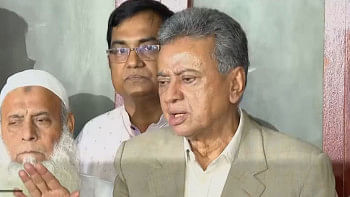Automation boosts Barishal’s salt processing

The use of automatic machines has increased processed salt production by 25 percent in Barishal, while improved efficiency has turned Jhalakathi district in the division into a manufacturing hub.
The shift from traditional manual methods to modern centrifuge machines has tripled production capacity in some factories, said Mohammad Ali Azgar, deputy manager of the Jhalakathi office of the Bangladesh Small and Cottage Industries Corporation (BSCIC).
Additionally, training programmes aimed at enhancing worker efficiency have also played a significant role, he said.
At present, around two-thirds of the division's processed salt factories are located in and around Jhalakathi, thanks to the convenient river transport facilities and the existence of a century-old tradition of salt processing.
According to BSCIC Jhalakathi, there are 12 salt processing factories in Barishal division, eight of which are situated in Jhalakathi.
Three of the eight factories have adopted automatic machines, resulting in a threefold increase in salt production, said Mohammad Al Amin, an officer at BSCIC Jhalakathi.
"Several others are in the process of upgrading their machinery."
The majority of the salt produced in Barishal is used in tanneries and dried fish processing units, with a smaller portion being processed for edible consumption, he said.
Currently, the eight salt processing factories in Jhalakathi employ around 300 to 400 permanent workers, with an additional 1,000 to 1,200 temporary ones depending on the industry.
Barishal division produces around 3,800 tonnes of industrial salt, of which 3,200 tonnes come from Jhalakathi, he said.
The entire 900 tonnes of edible salt produced in Barishal annually comes from Jhalakathi, Amin said.
A major portion of the salt is supplied to leather factories and dried fish processing hubs, particularly in Bhola and Patuakhali, where the demand for coarse or locally produced salt is high, he said.
Raw salt is transported via trawlers from Kutubdia and Chattogram, where it is refined and packaged for distribution.
Every 50-kg bag of industrial salt is sold at Tk 630, while a 25-kg edible salt bag is priced at Tk 370, traders said.
Anup Kumar Sarker, manager of New Jhalakathi Salt Industries, one of the factories that have installed modern centrifuge machines, said monthly production in his factory increased to 60 tonnes after installing a centrifuge machine in 2018, whereas it was below 20 tonnes under the manual system.
Mohammad Liyon, owner of ARS Salt Industries, said he started using automatic machines six years ago.
"My factory operates at full capacity for six months, but production slows during the rest of the year due to a shortage of crude salt from Kutubdia and Maheshkhali."
Liyon said automation had boosted production in his factory by 25 to 30 percent.
Humaun Kabir, owner of Lucky Salt Industries, said he has initiated plans to set up a modern mini-auto factory, as manual salt production is no longer profitable.
Modernisation will significantly impact local salt manufacturing, which began in the area during the British era, according to Chitta Dutta, a veteran resident.
Automation is expected to enhance employment opportunities in the region, he said.

 For all latest news, follow The Daily Star's Google News channel.
For all latest news, follow The Daily Star's Google News channel. 



Comments